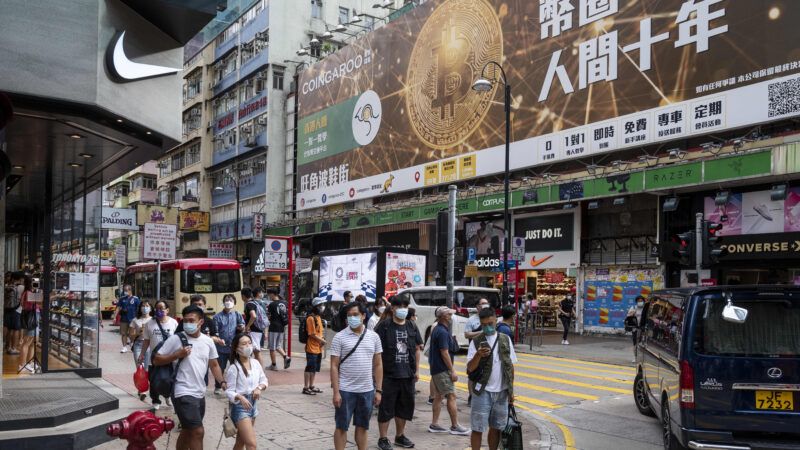China Expands Crypto Crackdown, Targeting Mining and Overseas Platforms
Though domestic crypto transactions were banned back in 2017, today's move signals that Chinese authorities are making good on their threats from earlier this year.

In regulatory action announced on September 15 but just today posted to the People's Bank of China's website, the Chinese government will be further cracking down on cryptocurrency transactions made via foreign exchanges, as well as mining. Though these actions were teased by Vice Premier Liu He in May, and domestic trading was banned back in 2017, the new notice clarifies the government's priorities while keeping the punishment for violating the law totally opaque.
From one English translation of the notice, the government vowed to "strengthen the management of Internet information content and access related to virtual currency," while "severely crack[ing] down on illegal financial activities related to virtual currencies."
"Recently, virtual currency trading hype activities have risen, disrupting economic and financial order, breeding illegal and criminal activities such as gambling, illegal fund-raising, fraud, pyramid schemes, and money laundering, and seriously endangering the safety of people's property," says the People's Bank of China, clarifying that "virtual currency does not have the same legal status as legal currency."
Formerly, international cryptocurrency trading platforms were aware that allowing users based in China involved wading into a tricky legal gray area given the domestic ban. This new notice clarifies the Chinese government's intent to eradicate and punish such activities to the best of its ability, while also cracking down on mining. The government's regulatory actions of the last four years have transformed China from a giant mining hub to something far from it.
"The language of the notice that came out is…somewhat scarily broad," notes Karman Lucero, a fellow at Paul Tsai China Center at Yale Law School. "One reason this is potentially different [than previous crackdowns] is the actors that are involved in this most recent crackdown language," says Lucero. This notice threatens action by "the most powerful regulators with the most clout…who can force people to change their behavior or lock them up for violating certain rules."
It also predictably carves out exceptions for its own digital yuan; currencies issued by "non-monetary authorities" are illicit, but currencies issued by monetary authorities (i.e., the digital yuan) are permissible. China's new digital currency would "give Beijing power to track spending in real time," reports The Wall Street Journal. It goes without saying that the digital yuan does not provide the same privacy perks that bitcoin does, as the central bank–issued currency would empower the government to better surveil the financial transactions of its subservients.
PBOC published a detail announcement on its website, Illegalized wide range of crypto related business such as fiat OTC, centralized trading/clearance, etc
This is what has been expected since VP's memo for the trading side after mining is fully banned https://t.co/EdlI8XzFg0
— Dovey "Rug the fiat" Wan (hiring) (@DoveyWan) September 24, 2021
But this may not actually change very much given the fact that the regulatory writing was already on the wall. Bloomberg reports:
Chinese officials are going further to stamp out crypto trading for its ties to fraud, money laundering and excessive energy usage. China already has rules that bar banks from offering crypto-related services. To get around such rules, traders have moved to over-the-counter platforms and offshore exchanges.
"China's ban on all cryptocurrency trading activity will have some short-term impact on the currency's valuation, but long-term implications are likely to be muted," said Ganesh Viswanath Natraj, an assistant professor of finance at Warwick Business School.
What much of the Western press is failing to accurately portray is that, to some degree, it's Groundhog Day—China tries this almost every year, and certainly signals its intention to crack the whip every few months. Regulators' renewed vigor started this past spring, at which point some local governments put pressure on mining operations to shut down. Before that, in 2019, Chinese regulators had crypto mining on their wish list of industries to eradicate (also leading to some mining operations closing), and two years before that, in 2017, China banned domestic exchanges.
Still, there's plenty to be concerned about with this newest notice, especially given that it specifically mentions violating public order or good customs. "Public order is one of those typical clauses you'll see in Chinese law, that gives the government a good amount of leeway to come in and enforce the law in whatever way suits their interests," says Lucero.
Meanwhile, in El Salvador, you can now pay for fries at McDonald's with bitcoin, and the United Arab Emirates just legalized crypto trading in the Dubai free zone on Wednesday. Though the Chinese Communist Party sees crypto as a threat to be suppressed, many other foreign governments have made way for the coming world order, as more people globally greet crypto as the liberatory technology that it is.


Show Comments (17)